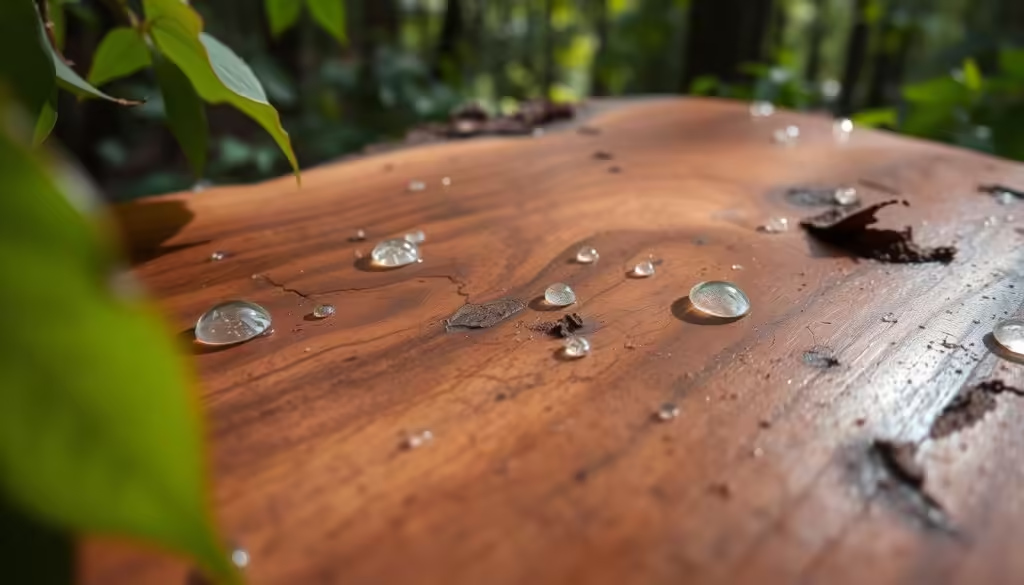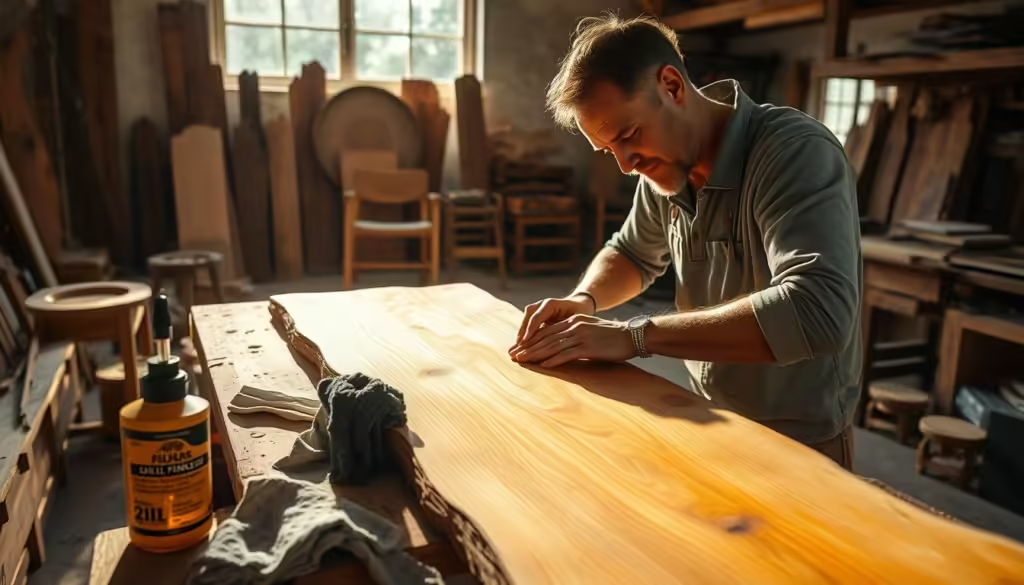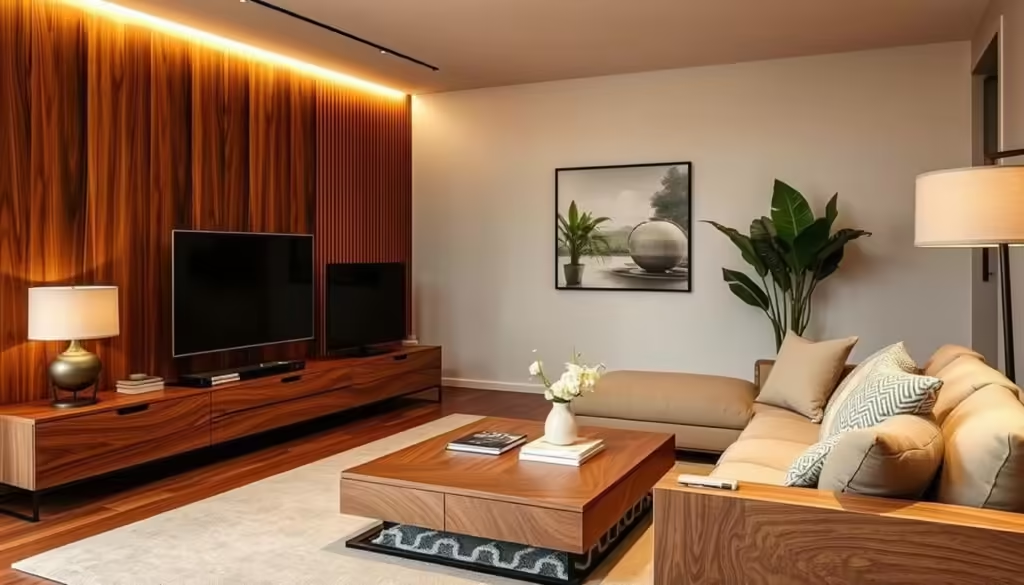
Key Takeaways
- Acacia wood is a versatile and durable hardwood with a distinctive appearance.
- It originates from various acacia tree species and is known for its strength and natural beauty.
- Acacia wood has a wide range of applications, from furniture and flooring to outdoor projects and interior design.
- Proper maintenance and care are essential to preserve the wood’s natural charm and longevity.
- Sustainable sourcing and certification ensure responsible forest management practices.
What is Acacia Wood?
The major sources include Australia while the rest include Africa and Asia. This wood is famous for its unique grain patterns, beautiful colors, and lasting quality. It’s a favorite for many uses.
Botanical Origins and Characteristics
Acacia trees are in the Fabaceae family commonly called legume or pea family trees. They are mostly planted in Australia, Africa, and Asia. These trees can handle different climates well. Acacia wood has different grain patterns and colors, like brown, golden, and reddish hues.
Varieties of Acacia Wood
- Black Acasia: A dense and durable variety with a deep, rich color and a distinctive grain pattern.
- Golden Acacia: Boasting a warm, golden-brown hue and a smooth, uniform texture, this variety is particularly sought after for its aesthetic appeal.
- Silver Acasia: This kind of acacia wood presents a paler, silverish hue and an unobtrusive, refined grain pattern: it’s most used in modern furniture and many interior design settings contexts. MimosaAcaciaa: This variety is also referred to as the “Wattle” tree and it produces feathery, yellow flowers and the wood shade is slightly lighter, and more yellowish than the primary species.
These are just a few examples of the diverse range of acacia wood varieties available, each with its unique characteristics and applications. Whether you’re interested in the rich, dark tones of Black Acasia or the warm, golden hues of the Golden Acasia, this versatile timber offers a wealth of options to choose from.
Acacia Wood Janka Hardness Rating
The Janka hardness scale is one of the most important to assess the stamina of wood. This is a demonstration of how well wood performs when it comes to the aspect of denting and wear in a car. Acacia wood, known for its strength, has a Janka rating of 1,700 to 2,200 pounds-force (lbf). This varies by the specific type of acacia.
Acacia wood’s high Janka rating makes it perfect for tough uses. It’s great for flooring, furniture, and outdoor projects. It is hard and suits a heavy traffic floor area and can also withstand the weather to maintain its ‘beauty’.
Compared to other woods, acacia stands out. For instance, Oak is about 1,360 lbs. Maple ranges from 1,450 to 1,560 lbs. The acacia wood Janka rating shows its unmatched durability. It’s ideal for projects needing how hard is acacia wood to be very strong.
“Acacia wood’s remarkable Janka hardness makes it a go-to choice for projects that require exceptional strength and resistance to wear and tear.”
Acacia wood Janka rating means that the person who is involved in the projects should know what wood they need to end the work. Its durability and resilience make it a top pick for demanding applications. It ensures long-lasting and high-performance results.
Where DoesAcaciaa Wood Come From?
Acacia wood is one of the strong and beautiful wood that is found in most African countries and other parts of the world. This is mainly due to the fact that Australia has very many and diverse terrains. It’s also found in parts of Africa and Asia, but Australia is the main source.
Primary Growing Regions
Australia has over 1,000 types of acacia trees. It is the largest producer and exporter of acacia wood. The climate and land in the country range from tropical to temperate and are suitable for growing acacia trees.
The main places for growing acacia in Australia are Queensland, New South Wales, and Victoria. Western Australia also has big areas for growing acacia.
Sustainable Sourcing and Certification
The demand for green timber is rising. The acacia industry in Australia is setting the pace in sustainable Harvesting. Many suppliers in Australia have certifications like the Forest Stewardship Council (FSC) and the Programme for the Endorsement of Forest Certification (PEFC).
This means the acacia wood you buy is from forests that are managed well and care for the environment.
| Region | Acacia Species | Sustainability Certification |
|---|---|---|
| Queensland, Australia | Acacia mangium, Acacia auriculiformis | FSC, PEFC |
| New South Wales, Australia | Acacia mearnsii, Acacia dealbata | FSC, PEFC |
| Western Australia | Acacia saligna, Acacia acuminata | FSC, PEFC |
Knowing where acacia wood comes from helps you choose eco-friendly options. In this way, the products you make from woodworking can be eco-friendly and at the same time durable.
Acacia Wood Applications
Acacia wood is great for many uses, from acacia woodworking and wood furniture to hardwood flooring and wooden decking. We’ll look at how acacia wood can be used. It is suitable for different tasks, and it has certain advantages in each of them.
Woodworking and Furniture
Woodworkers and furniture makers love acacia wood. It’s durable, stable, and beautiful. Its dense grain and resistance to damage make it great for furniture like tables, chairs, and cabinets.
Acacia wood’s warm tones and unique patterns add elegance to any piece. It’s a favorite for high-end furniture designs.
Flooring and Decking
Acacia wood is perfect for hardwood flooring and wooden decking. It’s hard and resists weather and wear. It’s tight grain and natural oils protect it from the elements.
Acacia wood flooring and decking are durable and look amazing. They add warmth and character to any space. Plus, they don’t warp or cup, keeping surfaces smooth for years.
With properties that are unprecedented and a grain that is rich and striking, Acasia wood stands as a king among woods in the business of wood work and outdoor living.
Advantages of Acacia Wood
Acacia wood is a top pick for furniture and design. It’s known for its durability and strength, and its aesthetic appeal is unmatched. This hardwood is usable and appropriate for various purposes.
Durability and Strength
Acacia wood is famous for being strong and long-lasting. Its dense grain and natural toughness make it great for busy areas. This one continues to look beautiful despite having spent years of use.
Aesthetic Appeal
Acacia wood also looks amazing. It’s natural colors and grain patterns add warmth and character to any space. It is ideal for flooring, kitchen and other cabinets, and various superb decorative furnishing adding beauty to any room.
| Advantage | Description |
|---|---|
| Durability | Acacia wood’s dense grain and natural resistance to wear and tear make it highly durable, ensuring long-lasting performance in high-traffic areas and furniture pieces. |
| Strength | As a hardwood, acacia wood possesses exceptional strength, making it a reliable choice for a variety of wood furniture and construction applications. |
| Aesthetic Appeal | The natural variations in color and grain patterns of acacia wood contribute to its stunning visual appeal, adding warmth and character to any interior design project. |
Acacia wood is a top choice for furniture and design. It’s strong, long-lasting, and beautiful. The show exquisitely caters to those who appreciate good quality and aesthetic value in their homes.
Acacia Wood Maintenance and Care
Keeping your acacia wood furniture, flooring, decking, fencing, or outdoor items looking great is easy. Just follow a few simple steps. This way, your acacia wood will stay beautiful for many years.
Finishing and Protection
Acacia wood naturally fights off weather damage and rot. Still, a good finish can make it even better. Use a top-notch sealant, varnish, or oil-based finish on your acacia wood. These coatings protect the wood from sun damage, fading, and warping.
When you finish your acacia wood, read the instructions carefully. This ensures the best look and longest-lasting finish. Still, do not forget to put a fresh finish after several years or even after several years of use have passed. This keeps your acacia wood looking its best.
- Apply a high-quality sealant, varnish, or oil-based finish to protect the wood.
- Follow the manufacturer’s instructions carefully for optimal results
- Reapply the finish every few years to maintain the wood’s appearance
“Proper care and maintenance are the keys to enjoying the exceptional durability and natural beauty of acasia wood for years to come.”
By following these easy tips, your acacia wood furniture, flooring, decking, fencing, and outdoor items will always impress. With the right care, your acacia wood will be a valuable and enjoyable part of your home for years.

Acacia Wood vs. Other Hardwoods
Selecting the right type of hardwood is crucial. To this end,d it is necessary to understand the position of Acacia wood about the other sorts of wood. Let’s look at a comparison to help you decide.
Hardness and Durability
Acacia wood has a high Janka hardness rating. This makes it very durable. Compared to oak, maple, and cherry, acacia is stronger and lasts longer.
For hardwood flooring or wooden furniture, the hardness of acacia makes it stand out.
Aesthetic Appeal
Acacia wood looks unique and beautiful. Its grain patterns and warm tones add elegance to any space. Of course, oak and maple both have a nice appearance however, acacia has an unusual hue.
It’s a top pick for those wanting something unique.
Environmental Sustainability
| Hardwood | Sustainability | Certification |
|---|---|---|
| Acacia | Highly Sustainable | FSC, PEFC |
| Oak | Moderately Sustainable | FSC |
| Maple | Moderately Sustainable | FSC |
Many Australian timber buyers care about sustainability. It turns out that acacia wood is highly sustainable for two main reasons – it grows and regrows very quickly. It’s often certified by FSC and PEFC.
This meets the growing need for eco-friendly wood furniture and hardwood flooring.
Acacia can be used as a substitute for other types of hardwood depending on the preference that one has. Knowing each wood’s strengths helps you pick the best for your project and design.
Acacia Wood in Interior Design
Acacia wood is a favorite in interior design for its natural beauty and flexibility. It has rich, warm tones and unique grain patterns. This makes it perfect for many design styles, from modern to rustic.
Acacia wood adds depth and texture to any room. It can help create a cozy or modern look, depending on what you want. This is a critical component of the realization of your design concepts.
For wood furniture, acacia is a top pick because it’s durable and stylish. It’s great for hardwood flooring and wooden decking. It gives homeowners and designers a blank canvas to express their creativity.
Picture a rustic living room with an acacia wood coffee table and earthy furnishings. Or imagine a modern dining area with an acacia wood table and minimalist chairs. The options are endless with acacia wood.
If you want to add natural elegance to your spaces, think about acacia wood. It makes rooms look better and adds warmth and authenticity to your design.

“Acasia wood’s natural beauty and versatility make it a highly sought-after material in the world of interior design.”
Conclusion
Acacia wood is a hardwood that stands out for its unique qualities. It is ideal for woodworkers, homeowners, or designers who searching for a multifunctional material. Acacia wood can make your projects shine and add beauty to your space.
It’s incredibly durable and strong, making it great for many uses. From furniture and floors to outdoor decks and fences, acacia wood is a top pick. It is also fine-grained and has warm colors which are very suitable for interior works as it gives elegance to any room. Acacia wood comes from sustainable forests and is harvested responsibly. This means it’s good for the planet. With the right care, it lasts a long time, giving you lasting value and enjoyment.
FAQ
What is acacia wood?
Acacia wood, also known as acacia wood, is a hardwood from the Fabaceae family. This family encompasses more than 1,300 different species of trees, shrubs, and vines. It comes from Australia and parts of Africa and Asia. It’s known for its unique grain patterns, color variations, and durability.
What are the different varieties of acacia wood?
There are many varieties of acacia wood, each with its look. Some common types are Australian blackwood, golden wattle, and koa wood. These vary in color, grain patterns, and other features, giving you many options for your projects.
What is the Janka hardness rating of acacia wood?
Acacia wood is very hard, with a Janka rating of 1,700 to 2,200 lbs. This makes it great for durable uses like flooring, furniture, and outdoor structures.
Where does acacia wood come from?
Acacia wood mainly comes from Australia, Africa, and Asia. It’s a native species in Australia. When choosing acacia wood, look for sustainable sources and certifications to support eco-friendly production.
What are the common applications of acacia wood?
Acacia wood is versatile for many uses. It’s used in woodworking, furniture, flooring, decking, and outdoor structures. Its durability and beauty make it popular for both homes and businesses.
What are the advantages of using acacia wood?
Acacia wood is known to be very hard and strong. It has a high Janka rating which makes it ideal for taking on wear and tear.. It’s also beautiful and versatile, making it a favorite in interior design.
How do I maintain and care for acacia wood?
To keep acacia wood looking good, you need to care for it. Use the right sealants, stains, or oils to protect it from moisture and UV rays. Regular cleaning and gentle care will help your acacia wood last a long time.
How does acacia wood compare to other hardwoods?
Acacia wood stands out for its durability, strength, and beauty. It’s a strong competitor to other hardwoods. Its unique features make it a great choice for many projects, from furniture to flooring and design.
How can I incorporate acacia wood into my interior design?
Acacia wood is perfect for interior design because of its beauty and versatility. It adds warmth and elegance to any space. Use it for furniture, flooring, or accents to enhance your room’s style.
